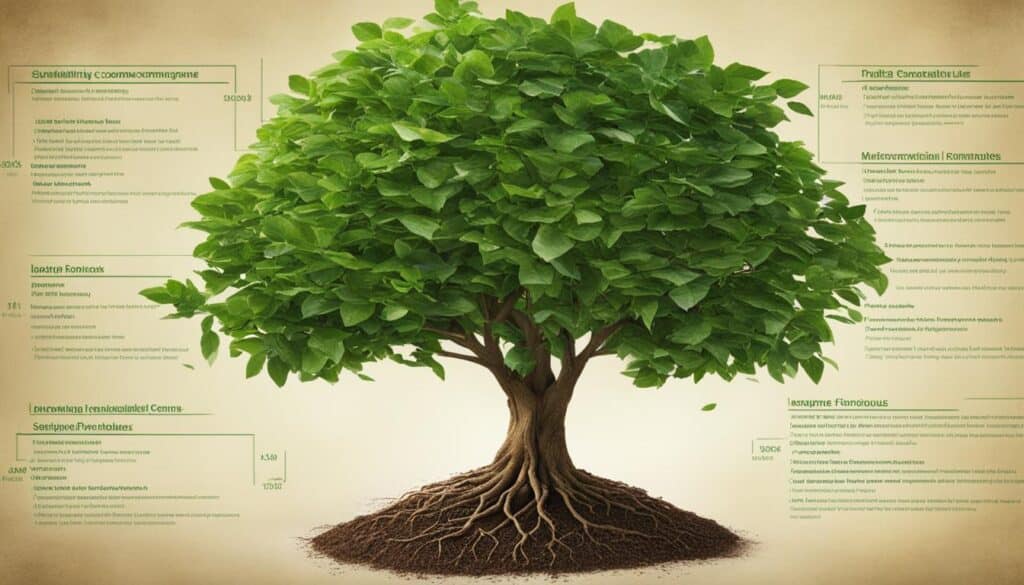The IB Economics syllabus underwent significant changes in 2022, introducing new units and adjusting the weighting of assessments. This comprehensive guide will provide insights and tips to excel in the revamped course.
Key Takeaways:
- Understand the changes in the 2022 IB Economics syllabus and the new unit structure.
- Familiarize yourself with the revised assessment weightage for HL Economics.
- Explore the new role of Paper 3 as the 'policy paper' and its requirements.
- Recognize the increased focus on sustainability and its connection to economic principles.
- Develop critical thinking skills to apply economic principles to real-world scenarios effectively.
Understanding the Overhaul
The 2022 IB Economics syllabus includes four main units: Introduction to Economics, Microeconomics, Macroeconomics, and The Global Economy. The reshuffling of the syllabus is aimed at incorporating these new units and aligning with the changing economic landscape. This section will provide an overview of the key changes in the syllabus and the implications for students.
To navigate the revamped syllabus successfully, it is crucial to understand the content covered in each unit. The Introduction to Economics unit provides a foundation for the subject, introducing fundamental economic concepts and theories. Microeconomics focuses on individual economic agents, such as consumers and firms , and delves into topics like market structures and pricing. Macroeconomics explores the behavior of the economy as a whole, including topics such as inflation, unemployment, and economic growth. The Global Economy unit examines international trade, globalization, and economic development.
With these changes, students can expect a more comprehensive and multidimensional approach to the study of economics. The addition of new units reflects the evolving nature of the subject and enhances students' understanding of real-world economic issues. It also offers opportunities for critical thinking , problem-solving, and applying economic principles to practical scenarios.
Table: Updated Units in the 2022 IB Economics Syllabus
| Unit | Description |
|---|---|
| Introduction to Economics | Foundational concepts and theories in economics |
| Microeconomics | Focus on individual economic agents and market structures |
| Macroeconomics | Study of the behavior of the economy as a whole |
| The Global Economy | Exploration of international trade, globalization, and economic development |
By familiarizing themselves with the updated syllabus and its units, students can better prepare for the assessments and excel in the new IB Economics course. The following sections will delve deeper into the assessment weightings, specific changes in the marking scheme, and other essential aspects of the revamped syllabus.
IB Economics HL Assessment Criteria
As part of the revamped IB Economics syllabus, the assessment criteria for both SL and HL Economics have undergone some changes. Understanding these criteria is crucial for students to excel in their exams and internal assessments (IA).
For SL Economics, the weightage for assessments is as follows: IA commentaries now constitute 30% of the overall grade, while Paper 1 retains its weight at 30% and Paper 2 carries a 40% weight.
For HL Economics, the assessment criteria are slightly different. Paper 1 reduces to 20%, and both Paper 2 and Paper 3 each carry a weight of 30%. The IA contributes the final 20% of the overall grade. It is important for HL Economics students to focus on the IA, as it plays a significant role in determining their final grade.
These changes in weightage reflect the IB's emphasis on the application of economic theory and critical thinking skills. Students are expected to analyze real-world economic issues, evaluate different perspectives, and propose effective solutions. The IA allows students to demonstrate their ability to apply economic concepts and theories to real-life scenarios.

| Sustainability Topics | Description |
|---|---|
| Sustainable Development | Explores the meaning and goals of sustainable development, emphasizing the need to balance economic growth with social and environmental considerations. |
| Poverty and Sustainability | Examines the relationship between poverty and sustainability, highlighting the importance of addressing poverty as part of sustainable development efforts. |
| Environmental Economics | Investigates the economic impact of human activities on the environment, including market failures and externalities. |
| Sustainable Policies | Focuses on the formulation and evaluation of economic policies that promote sustainability and address global challenges. |
What Remains Unchanged
While the 2022 IB Economics syllabus has introduced significant changes, there are elements that remain consistent. The core principles and teachings of economics continue to form the foundation of the course, providing students with a solid understanding of the subject.
One aspect that remains unchanged is the assessments. Although there have been adjustments in the weighting of assessments, the format and expectations of exams and internal assessments (IA) remain largely the same. Students can still rely on previous resources and past exam papers to supplement their preparation.
It is important to note that despite the changes in the syllabus, the fundamental concepts and theories of economics are timeless. The principles of supply and demand, market structures, and economic decision-making continue to be key areas of study. Students should focus on mastering these foundational concepts to succeed in the new syllabus.
Overall, while the 2022 IB Economics syllabus brings about significant changes, students can take comfort in knowing that the core principles of economics remain constant. By leveraging their understanding of these principles and adapting to the new topics and assessments, students can navigate the revamped syllabus with confidence.
Table: Summary of Unchanged Aspects in the 2022 IB Economics HL Syllabus
| Aspect | Details |
|---|---|
| Assessments | The format and expectations of exams and internal assessments remain largely unchanged. |
| Core Principles | The fundamental concepts and theories of economics continue to form the foundation of the course. |
| Resources | Previous resources and past exam papers are still valuable study aids. |
The Key Concepts Of The New Pattern
The new pattern of the IB Economics paper introduces key concepts that students must grasp to excel in the exam. These concepts form the foundation of understanding and applying economic principles to real-world situations. By mastering these key concepts, students can develop their critical thinking skills and analyze economic issues from multiple perspectives.
One of the key concepts emphasized in the new pattern is sustainability. The syllabus now includes a dedicated section on sustainable development, covering topics such as sustainable development goals and the connection between sustainability and poverty. Students will learn how economic decisions can impact the environment and society, and explore strategies to achieve sustainable development.
Another important concept is scarcity. Economics is built on the fundamental problem of scarcity, which refers to limited resources and unlimited wants. Understanding scarcity helps students analyze how choices are made, how resources are allocated, and the impact of scarcity on individuals, societies, and markets. Students will learn to evaluate trade-offs and make informed decisions considering the opportunity cost.
The concept of intervention also plays a significant role in the new pattern. Students will study how governments and other actors intervene in the economy to achieve specific goals, such as price stability or income redistribution. They will explore different forms of intervention, such as taxes , subsidies, and regulations, and analyze their effects on market outcomes and economic efficiency.
| Key Concepts | Description |
|---|---|
| Sustainability | Focuses on achieving economic growth while preserving the environment and meeting the needs of present and future generations. |
| Scarcity | Refers to limited resources and unlimited wants, forcing individuals and societies to make choices. |
| Intervention | Examines how governments and other actors intervene in the economy to influence market outcomes and achieve specific goals. |
| Interdependence | Explores the interconnectedness of economies and how changes in one country can impact others through trade, investment, and financial flows. |
| Behavioral Economics | Examines how psychological, cognitive, and emotional factors influence economic decision-making. |
Role Of Critical Thinking
Critical thinking skills play a significant role in the new IB Economics HL syllabus. The syllabus encourages students to apply economic principles to real-world scenarios, analyze complex problems, and formulate effective strategies to tackle them. By developing critical thinking skills, students can gain a deeper understanding of economic concepts and their practical implications.
One aspect of critical thinking emphasized in the syllabus is understanding behavioral economics. This branch of economics explores how individuals' decision-making processes are influenced by psychological, social, and emotional factors. By studying behavioral economics, students learn to recognize the limitations of rational consumer choice and understand the implications of these limitations on economic decision-making.
“In order to excel in IB Economics, students must go beyond memorizing theories and formulas. They need to develop the ability to analyze complex economic issues, think critically, and propose innovative solutions.”
Another important aspect of critical thinking in the new syllabus is to consider the sustainable development goals and the connection between sustainability and poverty. Students are encouraged to think critically about the economic challenges posed by sustainability issues and propose strategies to address them. Understanding the interdependence of economic, social, and environmental factors are crucial for developing comprehensive solutions to global issues.
| Key Points | Benefits |
|---|---|
| Application of economic principles to real-world scenarios | Enhances problem-solving skills |
| Understanding behavioral economics | Recognizes the limitations of rational consumer choice |
| Focus on sustainability and poverty | Develops critical thinking and proposal skills |
Developing critical thinking skills is essential for students pursuing IB Economics HL. By honing their analytical abilities and understanding the limitations of rational consumer choice, students can become well-equipped to analyze complex economic issues and propose effective solutions. The new syllabus encourages students to think critically, apply economic principles to real-world situations, and become active participants in addressing global economic challenges.
Focus On Sustainability And Global Issues
The newly revamped IB Economics HL syllabus places significant emphasis on sustainability and global issues. It aims to equip students with the knowledge and skills to analyze and propose solutions to real-world economic challenges. By exploring topics such as sustainable development, poverty, inequality, and market failures, students will gain a deeper understanding of the interconnectedness of global economies and the urgent need for sustainable solutions.
One of the key additions to the syllabus is the dedicated section on sustainable development. This section delves into the meaning of sustainable development, the United Nations' Sustainable Development Goals, and the relationship between sustainability and poverty. By studying these topics, students will develop a holistic understanding of the economic, social, and environmental aspects of sustainable development and its implications on a global scale.
In addition to sustainability, the syllabus also addresses other global issues such as poverty and inequality. Students will explore the causes and consequences of poverty, the impact of inequality on economies, and potential policy interventions to alleviate these challenges. By examining real-world case studies and data, students will gain insights into the complex dynamics of poverty and inequality and develop critical thinking skills to propose effective solutions.
Table: Examples of Global Economic Challenges
| Global Economic Challenge | Description | Implications |
|---|---|---|
| Climate Change | The impact of greenhouse gas emissions, rising temperatures, and changing weather patterns on economies and communities. | Higher costs of adaptation and mitigation, potential loss of biodiversity and agricultural productivity. |
| Income Inequality | The unequal distribution of income and wealth within and between countries. | Social unrest, reduced social mobility, hindered economic growth, and increased poverty rates. |
| Global Trade Imbalances | The unequal distribution of trade surpluses and deficits among countries. | Trade tensions, protectionism, potential currency fluctuations, and imbalances in global economic growth. |
By integrating the study of sustainability and global issues into the syllabus, the IB Economics HL program aims to cultivate a new generation of economists and policymakers who are equipped to address the complex challenges facing our world. Students will develop a deep understanding of the economic principles that underpin these issues and be able to propose innovative and sustainable solutions for a better future.
Changes in the Syllabus and Marking Scheme
The 2022 IB Economics syllabus brings forth significant modifications to the course structure and assessment criteria. The syllabus now comprises four main units: Introduction to Economics, Microeconomics, Macroeconomics, and The Global Economy. These units have been introduced to align the syllabus with the evolving economic landscape and equip students with a comprehensive understanding of contemporary economic theories and concepts.
Alongside the changes in the syllabus, the marking scheme for both SL and HL assessments has been adjusted. In SL Economics, the weighting for Internal Assessment (IA) commentaries remains at 30% of the overall grade. Paper 1 retains its weight at 30%, while Paper 2 accounts for 40% of the final grade. For HL Economics, the weightage for Paper 1 is reduced to 20%, with Paper 2 and Paper 3 each carrying 30% weight. The Internal Assessment now contributes the final 20% of the overall grade.
To provide students with a holistic understanding of economics, the new syllabus places an increased focus on sustainability and global issues. A dedicated section on sustainable development introduces students to its meaning, sustainable development goals, and the relationship between sustainability and poverty. These topics are crucial for developing students' knowledge and awareness of the broader economic challenges faced by the world today.
| Assessment | SL Economics | HL Economics |
|---|---|---|
| Paper 1 | 30% | 20% |
| Paper 2 | 40% | 30% |
| Paper 3 | N/A | 30% |
| IA Commentaries | 30% | 20% |
While the changes in the syllabus may require students to adapt their study strategies, the core principles of economics remain consistent. Past exam papers and other resources from previous years can still prove to be valuable study aids. As students navigate through the revamped syllabus and marking scheme, it is important to focus on understanding the new units, mastering the assessment criteria, and applying economic principles to real-world scenarios effectively.
Conclusion
Navigating the new IB Economics syllabus for 2022 may seem daunting, but with a clear understanding of the changes, a focus on sustainability, and the core principles of economics, students can excel in this challenging course. Success in IB Economics requires not only mastering the content but also applying economic principles to real-world scenarios effectively.
With the revamped weighting of assessments, students must allocate their study time wisely and ensure they dedicate sufficient effort to each component of the course. The increased emphasis on sustainability reflects the growing importance of this global issue in the field of economics. By mastering sustainable development and its connection to poverty and market failures, students will not only gain a strong foundation in economics but also develop the skills needed to propose solutions to real-world economic challenges.
As students embark on this new syllabus, they must also remember that despite the changes, the fundamental principles of economics remain unchanged. Concepts such as scarcity, intervention, and interdependence continue to form the bedrock of economic understanding. By applying critical thinking skills and analyzing economic scenarios from a behavioral perspective, students can deepen their understanding and make informed decisions in their assessments.
Overall, the new IB Economics syllabus is designed to prepare students to become knowledgeable and responsible global citizens. By navigating the changes in weighting and focusing on sustainability, students can confidently tackle the challenges that lie ahead, ultimately achieving success in the IB Economics HL course .
FAQ
What are the main units included in the 2022 IB Economics syllabus?
The main units included in the 2022 IB Economics syllabus are Introduction to Economics, Microeconomics, Macroeconomics, and The Global Economy.
How has the weightage for assessments changed in the new syllabus?
In the new syllabus, for SL Economics, IA commentaries constitute 30% of the overall grade, Paper 1 retains its weight at 30%, and Paper 2 carries a 40% weight. For HL Economics, Paper 1 reduces to 20%, Paper 2 and Paper 3 each weigh 30%, and IA contributes the final 20%.
What is the role of Paper 3 in the revamped syllabus?
In the revamped syllabus, Paper 3 takes on a new role as the 'policy paper'. It focuses on quantitative elements, requires definitions and explanations, and challenges students to recommend policies based on given scenarios.
What is the new addition in the 2022 IB Economics syllabus?
The 2022 IB Economics syllabus introduces sustainability as a notable addition. It includes a dedicated section on sustainable development, covering its meaning, sustainable development goals, and the connection between sustainability and poverty.
Are there any changes to previous resources and past exam papers?
Despite the significant changes in the 2022 IB Economics syllabus, previous resources and past exam papers can still be valuable study aids as the fundamental principles and core teaching of economics remain consistent, and assessments undergo minimal changes.
What are the key concepts of the new pattern in the syllabus?
The new pattern of the IB Economics paper is based on key concepts such as sustainability, scarcity, intervention, interdependence, and more. The focus is on developing conceptual understanding, critical thinking skills, and the ability to apply economic principles to real-world situations .
How important is critical thinking in IB Economics?
Critical thinking skills are vital in IB Economics. The new syllabus emphasizes the application of economic principles to real-world scenarios, encouraging students to analyze and formulate strategies to tackle problems. Understanding behavioral economics and the limitations of rational consumer choice are also important aspects.
What is the increased focus on in the revamped syllabus?
The revamped syllabus places significant focus on sustainability and global issues. Students will explore topics related to sustainable development, poverty, inequality, and market failures. The syllabus aims to create better global citizens who can analyze and propose solutions to real-world economic challenges.
What changes have been made to the syllabus and marking scheme?
The 2022 IB Economics syllabus introduces updated units and adjusts the marking scheme. The new syllabus includes Introduction to Economics, Microeconomics, Macroeconomics, and The Global Economy. Both SL and HL assessments have been modified, with changes in paper weightages.




